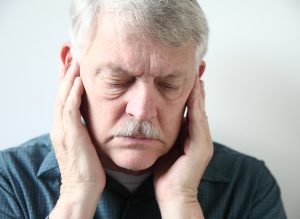 A typical Saturday for you involves sitting down to watch the Buckeyes take on their next Big Ten foe. While viewing the game, it’s common for you to snack on some of your favorite foods, but today you’re interrupted by a pain in your jaw while chewing. You don’t know what has caused this, but you’d like some relief. Your dentist in Dublin says this could be a symptom of TMJ (temporomandibular joint) disorder. Read on to learn what can cause this condition, and find out what can be done about it.
A typical Saturday for you involves sitting down to watch the Buckeyes take on their next Big Ten foe. While viewing the game, it’s common for you to snack on some of your favorite foods, but today you’re interrupted by a pain in your jaw while chewing. You don’t know what has caused this, but you’d like some relief. Your dentist in Dublin says this could be a symptom of TMJ (temporomandibular joint) disorder. Read on to learn what can cause this condition, and find out what can be done about it.
What is TMJ Disorder?
To understand what TMJ disorder is, we must first look at the anatomy of the human jaw. Where the upper and lower parts meet is called the TMJ, which is a hinge that has dynamic capabilities. It can move through the following planes of motion:
- Side-to-side
- Up and down
- Forward and back
- In an elliptical pattern
While this free movement makes the TMJ very versatile, it also leaves it more vulnerable to overuse and joint wear. Over time, the cartilage that supports the TMJ can also become worn and cause pain and other problems.
What are the Symptoms of TMJ Disorder?
Here are some of the common warning signs of TMJ issues:
- Headaches
- Pain when chewing
- Swelling of the face
- Unusual back or neck pain
- Stiffness or inability to move the jaw
- Clicking in the jaw when eating or speaking
How Can TMJ Disorder be Treated?
A main contributor to TMJ dysfunction is increased stress. That’s because one of the ways your body can sometimes subconsciously respond to stress is to clinch the jaw tightly, which can lead to a condition called bruxism (teeth grinding). The grinding can then lead to premature enamel wear and TMJ disorder.
While you can’t always eliminate the source of your stress, you can control how you respond to it. Here are some habit changes to consider:
- Take deep breaths in stressful situations.
- Incorporate exercise into your daily routine.
- Start meditating on a regular basis to improve your response to stressors.
Seek Professional Help
Your local dentist can also help you recover from this condition by either balancing how your teeth occlude or fitting you with a physiologic bite appliance. For any pain or swelling, you may also be advised to take an over-the-counter medication.
By being responsive at the first signs of pain in your jaw and reaching out to your local dentist, you can soon recover from your TMJ disorder symptoms and get back to cheering on your Buckeyes!
About the Author
Dr. Eric Buck is a graduate of The Ohio State University College of Dentistry, where he earned a Doctor of Dental Surgery degree. Throughout his career, he’s been an active learner, maintaining affiliation with such prestigious organizations as the Spear Education Society and the American Orthodontists Society. Dr. Buck treats TMJ disorder at Distinctive Smiles, and he can be reached for more information through his website.
